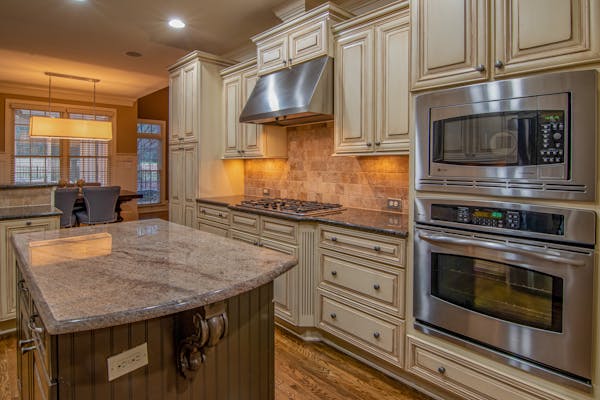
The concept of a smart home is no longer a futuristic fantasy. From lighting and security systems to entertainment and climate control, various aspects of our homes are being revolutionized by smart technology. Among these advancements, smart kitchen appliances stand out for their potential to significantly transform our cooking and dining experiences. This article delves into the benefits of smart kitchen appliances, exploring how they can enhance convenience, efficiency, safety, and even health.
What Are Smart Kitchen Appliances?
Smart kitchen appliances are devices that connect to the internet or other devices to provide enhanced functionalities. They range from refrigerators and ovens to coffee makers and dishwashers, all equipped with sensors, touchscreens, voice control, and the ability to connect with smartphone apps. These features allow users to control, monitor, and automate their kitchen tasks remotely or through simple commands.
Benefits of Smart Kitchen Appliances
1. Convenience and Time-Saving
One of the primary benefits of smart kitchen appliances is the convenience they offer. With busy lifestyles, finding time to cook healthy meals can be challenging. Smart appliances streamline this process by allowing you to control them remotely. For instance, you can preheat your oven while commuting home or start your coffee maker from your bedroom. These time-saving features make it easier to manage daily tasks efficiently.
2. Enhanced Cooking Precision and Control
Smart kitchen appliances are equipped with advanced sensors and controls that provide precise cooking conditions. For example, smart ovens can maintain exact temperatures and cooking times, ensuring that your food is cooked to perfection every time. These appliances can also provide step-by-step cooking instructions, adjust cooking settings automatically, and even suggest recipes based on the ingredients you have on hand.
3. Energy Efficiency and Cost Savings
Energy efficiency is another significant benefit of smart kitchen appliances. Many of these devices are designed to optimize energy usage, reducing your household’s overall energy consumption. Smart refrigerators, for instance, can adjust their cooling cycles based on the time of day and frequency of door openings. Similarly, smart dishwashers can schedule cycles during off-peak hours to save on electricity costs. Over time, these energy savings can lead to substantial cost reductions on utility bills.
4. Improved Food Management and Waste Reduction
Smart refrigerators come with features that help manage food storage more effectively. They can track expiration dates, suggest recipes to use up ingredients before they spoil, and even create shopping lists based on what you have or need. This improved food management reduces food waste and ensures that you always have fresh ingredients available for your meals.
5. Healthier Eating Habits
By providing precise cooking instructions and suggesting healthy recipes, smart kitchen appliances can promote healthier eating habits. Some smart appliances can analyze the nutritional content of your meals, helping you make more informed dietary choices. Additionally, smart kitchen scales and thermometers ensure that you use the right portions and cooking temperatures, further supporting a healthy lifestyle.
6. Enhanced Safety Features
Safety is a critical aspect of any kitchen. Smart kitchen appliances are equipped with features that enhance safety, such as automatic shut-off, alerts for potential hazards, and remote monitoring capabilities. For instance, a smart stove can turn itself off if it detects that it has been left on for too long, preventing potential fire hazards. Similarly, smart ovens can send alerts to your phone if they detect smoke or an unusual temperature rise.
Key Smart Kitchen Appliances and Their Features
Smart Refrigerators
Smart refrigerators are perhaps the most versatile of all smart kitchen appliances. They come with a range of features designed to enhance convenience and efficiency:
- Touchscreen Interfaces: Allow users to browse recipes, create shopping lists, and manage calendars.
- Interior Cameras: Enable users to check the contents of their fridge remotely.
- Food Management Systems: Track expiration dates and suggest recipes based on available ingredients.
- Energy Efficiency: Optimize cooling cycles to reduce energy consumption.
Smart Ovens and Ranges
Smart ovens and ranges offer precise cooking control and a host of other benefits:
- Remote Control: Preheat, adjust temperatures, and monitor cooking progress from your smartphone.
- Cooking Programs: Automated programs for specific recipes, ensuring optimal cooking conditions.
- Voice Control: Integration with virtual assistants like Amazon Alexa and Google Assistant for hands-free operation.
- Safety Features: Automatic shut-off and alerts for potential hazards.
Smart Dishwashers
Smart dishwashers streamline the dishwashing process with advanced features:
- Remote Monitoring and Control: Start, stop, or schedule wash cycles remotely.
- Energy and Water Efficiency: Optimize cycles to use less water and energy.
- Maintenance Alerts: Notifications when filters need cleaning or when detergent levels are low.
Smart Coffee Makers
For coffee enthusiasts, smart coffee makers offer unparalleled convenience:
- Scheduled Brewing: Set your coffee maker to brew at a specific time.
- Remote Control: Start brewing from your smartphone or via voice command.
- Customization: Adjust brew strength and temperature to your preference.
The Future of Smart Kitchens
The future of smart kitchens looks promising, with ongoing advancements expected to bring even more benefits of smart kitchen appliances. Innovations such as artificial intelligence (AI) and machine learning will likely play a significant role in the evolution of these appliances.
AI and Machine Learning
AI and machine learning can make smart kitchen appliances more intuitive and personalized. For instance, AI-powered ovens could learn your cooking preferences over time and adjust settings automatically. Similarly, smart refrigerators could predict your grocery needs based on your usage patterns and dietary habits, and even place orders for you.
Integration with Other Smart Home Systems
As smart home ecosystems become more integrated, smart kitchen appliances will seamlessly interact with other devices in your home. For example, your smart oven could sync with your home’s lighting and climate control systems to create an optimal cooking environment. Additionally, voice assistants will become even more sophisticated, allowing for more natural and comprehensive control of your kitchen appliances.
Sustainability and Eco-Friendly Features
Future smart kitchen appliances will likely place a greater emphasis on sustainability. Innovations such as biodegradable materials, more efficient energy usage, and better recycling capabilities will become standard features. These eco-friendly advancements will not only benefit the environment but also contribute to cost savings and improved health outcomes.
Conclusion
Smart kitchen appliances are redefining the way we cook and manage our kitchens. The benefits of smart kitchen appliances—ranging from enhanced convenience and time savings to improved safety and health—underscore their value in modern households. As technology continues to advance, these appliances will become even more integral to our daily lives, offering greater efficiency, precision, and sustainability. Embracing smart kitchen appliances is not just about keeping up with the latest trends; it’s about making a long-term investment in a healthier, safer, and more efficient lifestyle.

